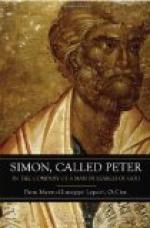But meantime, what was to be done? As the Bishop had rightly said, something must be done. Resolute on this point, H.Q. had called in the C.G. and the P.C. and, he believed, expert opinion on both sides the House of Commons; and the general opinion agreed upon was that Tommy should be educated to vote correctly when the time came, and to wait peacefully for that time. The Professor could tell them of schemes even now in process of formation at home in order that the land they loved might be cleaner, sweeter, better and happier, in the days to come. But Tommy, meantime, did not know of these things. He was apparently under the delusion that he must work out his own salvation, whereas, in point of fact, it was being worked out for him scientifically and religiously. If these things were clearly laid before him, H.Q. was convinced that agitation, dissatisfaction, and even revolution—for there were those who thought they were actually trending in that direction—would be nipped in the bud.
The scheme was simple and far-reaching. Lectures would be given all over the areas occupied by British troops. Every base would be organised in such a way that such lectures and even detailed courses of study should be available for everyone. Every chaplain, hutworker, and social entertainer must do his or her bit. They must know how to speak wisely and well—not all in public, but, everyone as the occasion offered, privately, in hut or camp, to inquiring and dissatisfied Tommies. They would doubtless feel themselves insufficient for these things, but study-circles were to be formed and literature obtained which would completely furnish them with information. He would conclude by merely laying on the table a bundle of the splendid papers and tracts already prepared for this work. The Professor would now outline what was being attempted at home, and then the meeting would be open for discussion.
The Professor was given half an hour, and he made an excellent speech for a cornered and academic theorist. The first ten minutes he devoted to explaining that he could not explain in the time; in the second, tempering the wind to the shorn lamb, he pointed out that it was no use his outlining schemes not yet completed, or that they could read for themselves, or that, possibly, without some groundwork, they could not understand; and in the third ten minutes he outlined the committees dealing with the work and containing such well-known names as Robert Smiley, Mr. Button, and Clydens. He sat down. Everyone applauded—the M.P., and possibly the A.C.G., because they honestly knew and respected these gentlemen, and the rest because they felt they ought to do so. The meeting was then opened for discussion.
Peter took no part in what followed, and, indeed, nothing over-illuminating was said save one remark, cast upon the waters by the Labour member, which was destined to be found after many days. They were talking of the lectures, and one of the ladies (Peter understood a Girton lecturer) was apparently eager to begin without delay. The M.P. begged to ask a question: Were there to be questions and a discussion?




